Dealing with climate change
ISK Group Aiming for Carbon Neutrality by 2050
With climate change becoming a major worldwide issue, the ISK Group has identified dealing with climate change and reducing environmental impacts as priority issues (materiality) and aims to become carbon neutral by 2050.
Reduction Targets
The ISK Group has set the reduction targets for CO2 emissions (Scope 1 and Scope 2). We will continue to strive for reduced emissions and carbon neutrality in order to promote Climate Change Mitigation and Adaptation.
2030: Target CO2 emissions reduction by 30% (against FY2019)
2050: Challenge carbon neutrality (net zero emissions)
Disclosure based on TCFD Recommendations

ISK has announced its support for the Task Force on Climate-Related Financial Disclosures (TCFD)* recommendations.
*TCFD (Task Force on Climate-Related Financial Disclosures): The TCFD recommends that companies evaluate the financial impact of the risks and opportunities posed by climate change on their business management and provide disclosure on the four areas of governance, strategy, risk management, and metrics and targets.
(TCFD website: https://www.fsb-tcfd.org/)
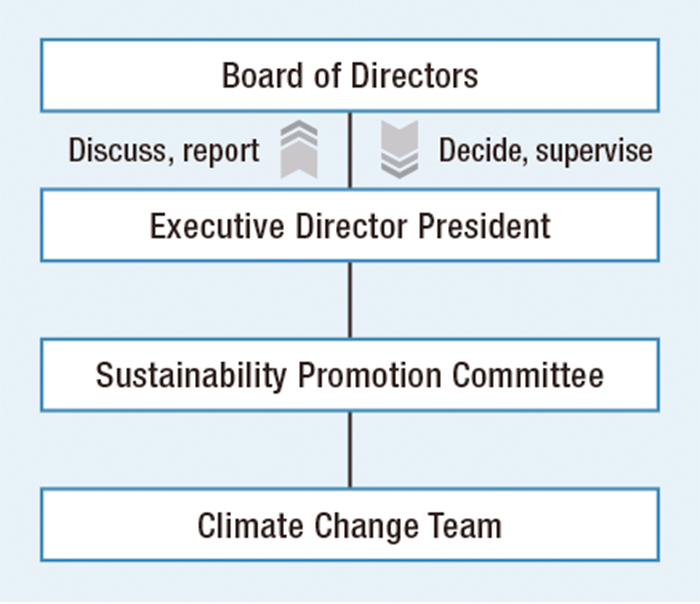
Governance
Concrete efforts in response to climate change are carried out by our Climate Change Team. This team operates under the Sustainability Promotion Committee, which reports directly to the President.
The team comprises people from factory management, manufacturing divisions, administrative department, and ISK affiliates.
The efforts and measures the team comes up with are deliberated on at Sustainability Promotion Committee meetings held at least twice a year, and those approved are consulted on and passed by the Board of Directors.
The progress of activities by the Sustainability Promotion Committee, including the Climate Change Team, is reported every three months to the Board of Directors, which supervises these activities.
Strategy
Chosen Climate Change Scenarios
Referencing climate change scenarios published by the IEA (International Energy Agency) and IPCC (Intergovernmental Panel on Climate Change), we selected scenarios of a rise of 1.5–2°C and 4.0°C. Recognizing that climate change’s impact on business becomes more evident in the medium- and long-term, we analyzed the impact of climate change until 2050, as the time horizon.
Analysis of the scenario for fiscal 2023, we extends to the organic chemicals business. All businesses of the ISK Group (inorganic chemicals/organic chemicals) were analyzed under the scenarios.
Average Worldwide Temperature Change Based on 1850–1900
*You can see the entire image in the figure by scrolling horizontally.
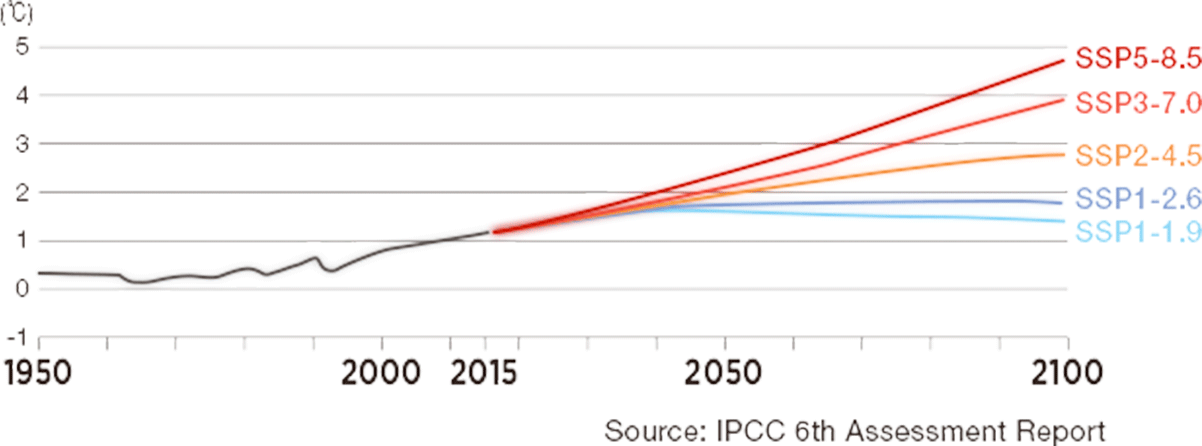
(IEA STEPS, SSP2-4.5, RCP8.5)
(IEA NZE 2050, IEA SDS, SSP1-2.6, RCP2.6)
Scenario Analysis Process
*You can see the entire image in the figure by scrolling horizontally.
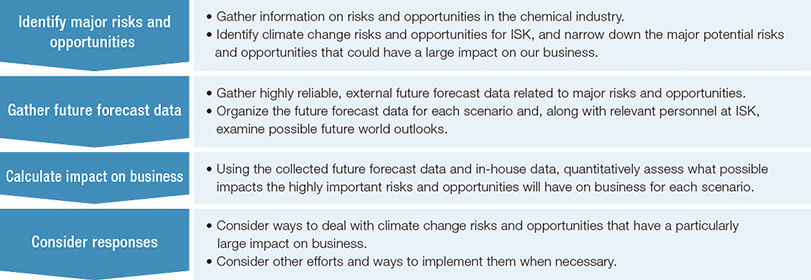
Scenario Analysis Results
The ISK Group used external information to analyze the main climate change risks and opportunities in our business, and gathered future forecast data related to each risk and opportunity.
Based on this, we considered the risks and opportunities that arise from the transition to the carbon neutral society under each of the 1.5–2°C and 4°C scenario. We then analyzed the major risks and opportunities that could impact our business up until 2050.
As a result, for the 1.5–2°C scenario, we identified risks such as greatly increased operating costs due to the imposition of a carbon tax on CO2 emissions.
Therefore, recognizing the importance of reducing CO2 emissions across the entire ISK Group, we will proceed with various planned measures towards achieving carbon neutrality by 2050.
Risk Management
One of the eight priority issues (materiality) that the ISK Group has identified is “dealing with climate change and reducing environmental impacts.”
In recognition of the urgency of climate change, the ISK Group has established the Climate Change Team under the Sustainability Promotion Committee. This team identified climate change risks, the results of which are assessed and controlled by the Sustainability Promotion Committee. When necessary, matters are reported to the Corporate Risk Management Committee.
Business Risks and Opportunities Identified through Risk Level Assessment and Scenario Analysis
*You can see the entire image in the figure by scrolling horizontally.
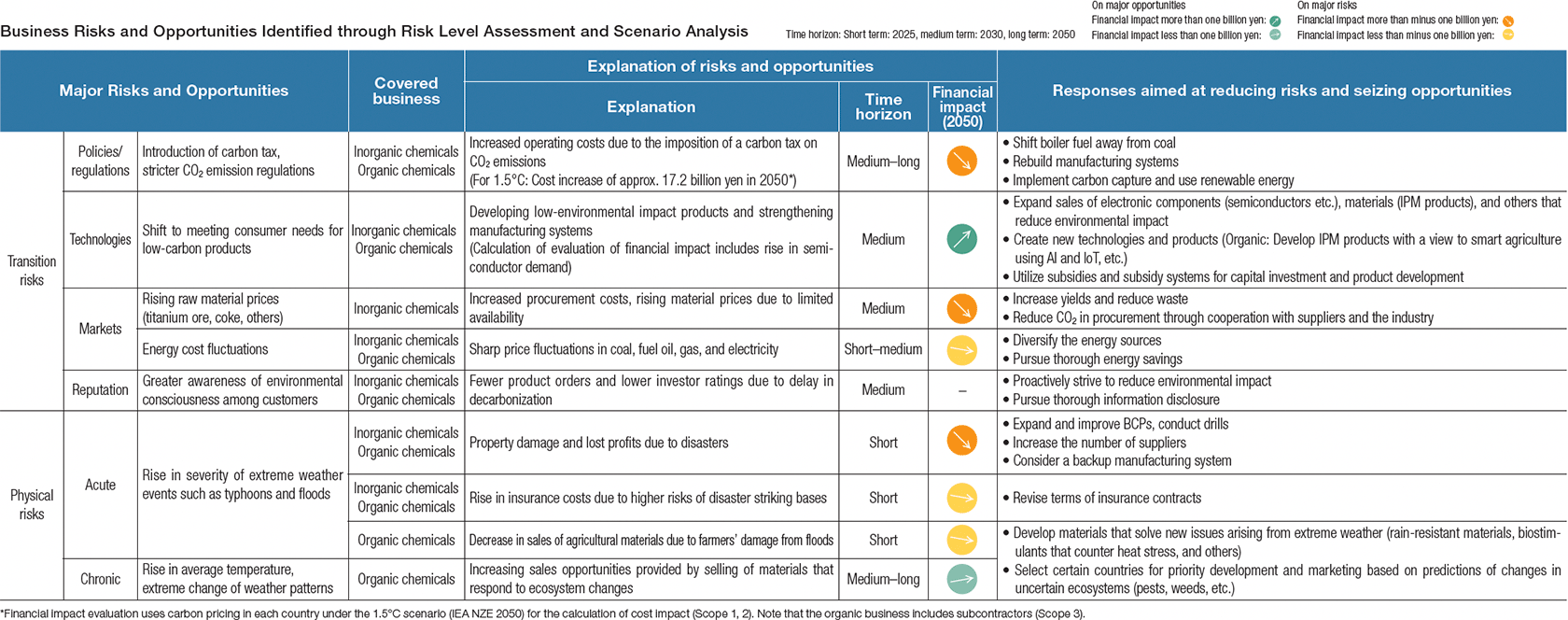
Indexes and Targets
For Scope 1 and 2 GHG (greenhouse gas) emissions, in addition to those disclosed last year at ISK Group companies in Japan, we also calculated those at overseas group companies so as to understand emissions for the entire ISK Group. Scope 3 (supply chain) emissions were also calculated in order to grasp the overall state of GHG emissions from ISK Group business activities. To reduce Scope 2 GHG emissions, the Yokkaichi Plant has begun including renewable energy from biomass in the electricity that it purchases.
GHG (Greenhouse Gas) Emissions of ISK Group (1,000 t-CO2)
*You can see the entire image in the figure by scrolling horizontally.

GHG Emissions of Scope3 (1,000 t-CO2)
*You can see the entire image in the figure by scrolling horizontally.
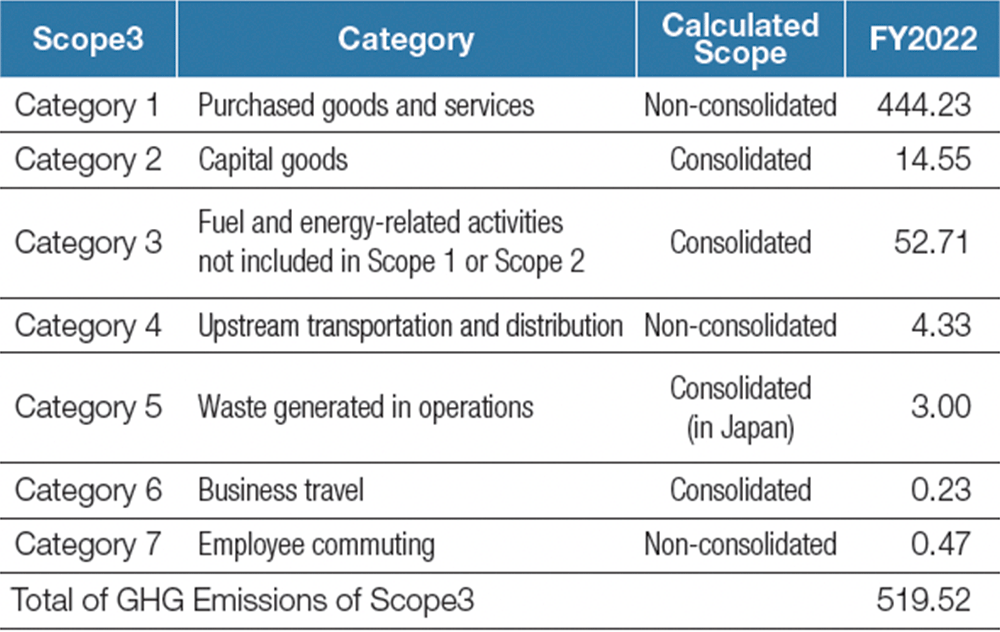
Scope1, 2, 3 GHG Emissions Share
*You can see the entire image in the figure by scrolling horizontally.
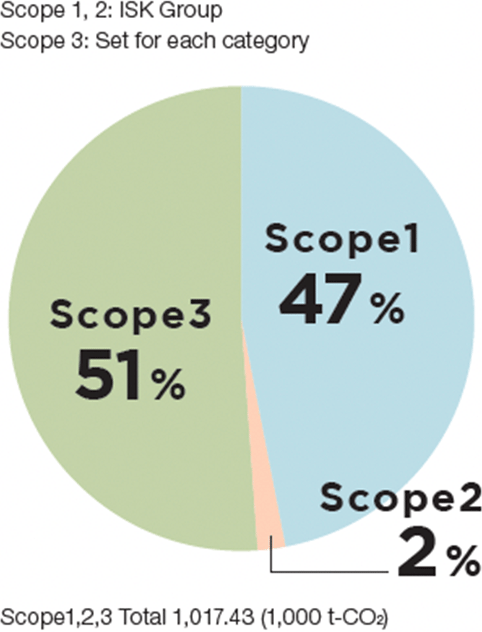
Drawing a Road Map to Carbon Neutrality
The Yokkaichi Plant, our flagship production base, has been using a coal-fired cogeneration system to achieve optimal energy costs in manufacturing. But because of the occurrence of extreme weather events due to climate change, reducing CO2 emissions has become a priority issue. We have therefore drawn a road map to carbon neutrality for the ISK Group in Japan through multistage CO2 reductions, with the Yokkaichi Plant at the center of this effort.
We aim to systematically reduce CO2 emissions (Scope 1 and Scope 2) 30% by 2030 compared to fiscal 2019. This will be achieved, for example, by replacing coal for boilers with low-carbon fuels, rebuilding manufacturing systems, thoroughly saving energy, using renewable energy, capturing CO2 in various processes, and improving facilities. Towards achieving carbon neutrality in 2050, in addition to the measures mentioned above, we will aim to dramatically reduce emissions through innovative technologies, and explore the development and implementation of decarbonization technologies such as CCUS (carbon capture,utilization, and storage).
CO2 Emission Reduction Road Map
*You can see the entire image in the figure by scrolling horizontally.
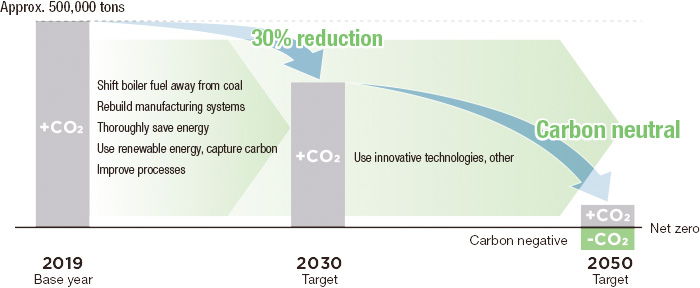
Environmental Initiatives
- Basic Policies on Environmental Protection and Safety & Health Promotion
- Environment, Safety, and Health Management System
- Environmental Protection Activities
-
Responsible Care Activities
- Dealing with climate change
- Joint Efforts with Government and Outside Organizations
